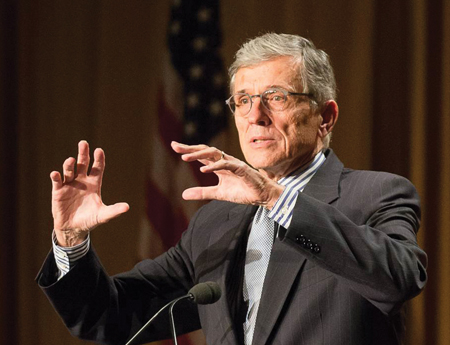Chairman Eyes Big Agenda In Catbird Seat

The smarter way to stay on top of broadcasting and cable industry. Sign up below
You are now subscribed
Your newsletter sign-up was successful
The industry is likely to get the measure of new FCC chairman Tom Wheeler in 2014 as he oversees what will almost surely be his defi ning issue—the broadcast incentive auctions. That will be a defining issue for broadcasters as well.
But before that, the upcoming H block auction in January could be a canary in a coal mine, and even some FCC insiders wonder whether it will be a boom or a bust. The more money the FCC raises in that first spectrum auction, the less pressure there is to make enough in the subsequent auctions to pay broadcasters— including moving expenses—and pay for building the interoperable emergency communications network.
Wheeler has pushed the broadcast incentive auction time line back about six months to a mid-2015 date, with a framework by mid-2014 and details later in the year. That gives him a little more time to kick the tires on the software systems running an auction of unprecedented complexity. So expect lots of activity, including public demonstrations of the auction software.
The Urge to Merge
If Comcast makes a play for Time Warner Cable, the industry will get the measure of Wheeler’s competitive philosophy. FCC commissioner Ajit Pai has suggested that such a merger would be unlikely to make it past the Democratic majority. But other FCC watchers say the administration could use the deal to apply new conditions to a Comcast/TWC meld, as it did with the Comcast/NBCUniversal deal.
How the FCC deals with the TV station “supergroup” mergers currently in front of the agency will also give the industry a sense of Wheeler’s chairmanship. Wheeler has already signaled such approval will be no rubber stamp, but the FCC did approve one of those big deals last month. The commission’s Media Bureau has asked Sinclair to restructure some of its spin-off deals, though Sinclair says that’s no biggie; Sen. Jay Rockefeller (D-W. Va.), chairman of the Senate Commerce Committee, has asked Wheeler to hold off on decisions until the government accountability office studies those sharing arrangements.
That cautionary note notwithstanding, the Media Bureau approved the Gannett/Belo deal in December but is making Gannett spin off KMOV St. Louis rather than allow it to continue to provide services to the station.
The smarter way to stay on top of broadcasting and cable industry. Sign up below
Houses in Motion
Congress will have to either renew the Satellite Television Extension and Localism Act (STELA) by the end of 2014 or let it sunset. Sunset is likely not an option. Rep. Greg Walden (R-Ore.), chairman of the House Communications Subcommittee, has suggested that retrans issues will not be hashed out in STELA now that he has signaled a time line for a major rewrite of communications law. That is good news for broadcasters, who think the law is working fine. Not so much for cable operators, who have been pushing for reform.
Rockefeller has introduced video reform legislation in advance of the STELA renewal, and Rep. Anna Eshoo (D-Calif.), ranking member of the House Communications Subcommittee, has been pushing for retrans reform, including introducing a bill in September—in the wake of the CBS/Time Warner Cable retrans impasse—that would mandate carriage during blackouts and other reforms.
But it will be tough not to address retrans in some form since the FCC’s ability to enforce good faith retrans negotiations—about the only muscle it currently flexes during impasses—will also either sunset or be renewed. The National Cable & Telecommunications Association board has also decided it needs to be a bigger player in the retrans debate.
Neutral Corner
If the D.C. Circuit court overturns or remands portions of the network neutrality rules, Wheeler could try to recraft them. But that could start up a huge fight he may not be looking for.
The telecom act rewrite proposed by Republicans Walden and Energy & Commerce Committee chair Fred Upton (R-Mich.) will likely push any major reform into 2015. But the planned hearings and white papers for 2014 will likely boost the billable hours of communications lawyers and keep media lobbyists busy.
The D.C. federal appeals court is expected to come out with a decision on the FCC’s Open Internet rules. If the court throws them out, it could be yet another test for Wheeler, who has signaled the government has a role in ensuring an open and interconnected Internet.
Look for the FCC to hold a final vote on eliminating the UHF discount, which could limit some station group expansion. Also expect the Supreme Court to vet broadcasters’ Aereo appeal in January, according to a knowledgeable source.
Meanwhile, broadcasters will have to wait a bit longer for media ownership rules relief. The FCC Media Bureau had been working on getting a quadrennial review item out the door, but Wheeler has pulled the item and will roll it into the 2014 review.
Contributing editor John Eggerton has been an editor and/or writer on media regulation, legislation and policy for over four decades, including covering the FCC, FTC, Congress, the major media trade associations, and the federal courts. In addition to Multichannel News and Broadcasting + Cable, his work has appeared in Radio World, TV Technology, TV Fax, This Week in Consumer Electronics, Variety and the Encyclopedia Britannica.

